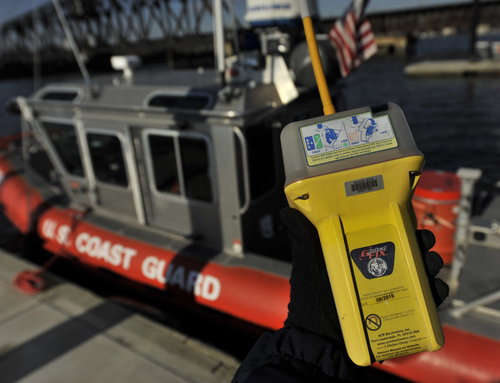After responding to more than 700 false alarms during 2018, the Coast Guard is urging mariners to make sure their emergency position indicating beacon (EPIRB) is properly registered.
EPIRBs transmit a distress signal to satellites, which is then relayed to ground stations and on to Coast Guard rescue centers and other emergency agencies. The devices can be triggered manually or automatically – as when they float free as a vessel sinks – but they can also activate by accident.
When a signal is received, the Coast Guard immediately investigates. In the 700-plus cases of false alerts, Coast Guard personnel were only able to contact 163 owners.
“The others had not registered their beacons, not updated their registration information, or had disposed of them improperly,” according to a Coast Guard statement.
“We handle EPIRB alerts with a bias for action,” said Lt. Daniel Dunn, a command duty officer in the Fifth Coast Guard District’s command center. “We have to treat them as actual distress calls until we can prove otherwise.”
When the satellites relay a position for an active EPIRB and watchstanders cannot trace it to a registered owner, that sends Coast Guard teams out to track down the device, often prowling docks and marinas. There have been cases of searchers finding beacons pinging in homes and vehicles.
Improper EPIRB registrations can also have deadly consequences during real emergencies. A clerical error in transcribing registration information was one factor cited by the National Transportation Safety Board in its report on the March 2009 sinking of the Lady Mary, a commercial fishing vessel based at Cape May, N.J., that sank with the loss of six lives.
Commercial fishing vessels, uninspected passenger vessels that carry six or more people, and uninspected commercial vessels are legally required to carry EPIRBs. The Federal Communications Commission requires all EPIRB owners to register their beacons with the National Oceanic and Atmospheric Administration, which manages the satellite network, and keep their registration information up-to-date.
If an unregistered beacon activates, the FCC can prosecute the owner based on evidence provided by the Coast Guard, and will issue warning letters or notices of apparent liability for fines up to $10,000.
“If people used this system appropriately, it would take a lot of the guesswork out of search and rescue,” said Dunn. “Unregistered EPIRBs result in lost time, money, and the misuse of resources that could be used to save someone’s life.”




